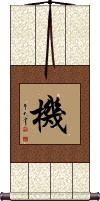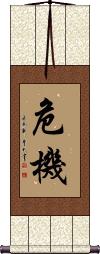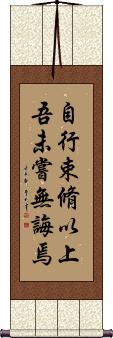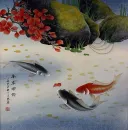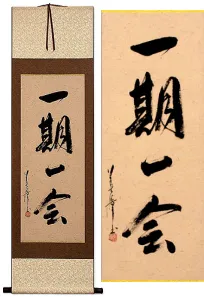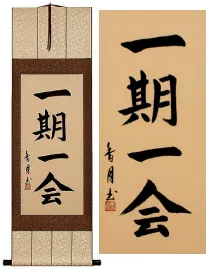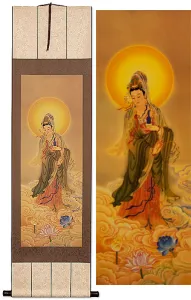Many custom options...
And formats...

Not what you want?
Try other similar-meaning words, fewer words, or just one word.
Have Opportunity in Chinese / Japanese...
Buy a Have Opportunity calligraphy wall scroll here!
Personalize your custom “Have Opportunity” project by clicking the button next to your favorite “Have Opportunity” title below...
Opportunity
機 is an odd one - I've seen this on coffee cups and posters with the meaning of “opportunity.”
機 is a correct definition but this character also means “machine.” In fact, if you put the character for “flying” in front of this character, you have the Chinese word for “airplane” (literally: flying machine). Alone, on a wall scroll, it will be generally understood as “opportunity” but I want you to know this extra information before you make your selection. Note that in Japanese and Korean, this has a similar meaning but can also mean machine or loom.
See Also: Success
Crisis equals Danger plus Opportunity?
危機 means crisis in Chinese and Japanese.
Separately, the first character here does mean “danger” or “to endanger,” and the second character can mean “opportunity.”
However, I want to debunk a myth that was propagated by some westerners who did not have a clear understanding of Asian languages...
While often, Chinese/Japanese/Korean compound words (words of two or more characters) are the sum of their parts, this is not always the case. The compound is often understood with a completely different meaning than the two characters individually.
Many have said that the Chinese/Japanese/Korean word for Crisis is made up of the characters for “danger” and “opportunity.” 危機 is true when phrased this way.
However, it's not absolutely correct to say that “danger + opportunity = crisis” in Asian cultures.
English example:
If I tell you that...
Bovine creature + Guy behind the plate in baseball = Locomotive train protection
![]()
...you would think I was mad. But consider that “cow + catcher = cowcatcher,” which is the device that used to be found on steam engines to protect them if they hit an animal on the tracks. When we hear the word “cowcatcher,” we don't separate the words into their individual meanings (necessarily).
The same is true with the word for crisis in Chinese/Japanese/Korean. While you can separate the characters, few Asian people would automatically do so in their minds.
The final answer:
It is a half-truth to say, “danger plus opportunity equals crisis” in Chinese/Japanese/Korean. Use this statement and concept with caution.
Also, the second character can mean “secret” or “machine,” depending on context so I guess you have to say “a dangerous machine = crisis” or “danger + a secret = crisis.” Both of these are only slightly more ridiculous than the first premise.
PS: 危機 is probably not a great word for a scroll unless you have a special use for it.
Once in a Lifetime
This Japanese title can be translated as “for this time only,” “chance meeting,” “one meeting, one opportunity,” “never again,” or “one chance in a lifetime.”
The characters literally mean “one time one meeting” - of course, the Kanji characters have meaning far beyond a direct translation like this.
Some might use this proverb to talk of an opportunity that presents itself just once in your life. It could also be a one-and-only chance meeting with your true soul mate. An expression of any event that might happen once in a lifetime.
This is primarily a Japanese title, however, there is also a Traditional Chinese (and old Korean) version of this proverb. Just the last character is different.![]() The traditional form was used in Japan before WWII and in Korea prior to 1900. This title is somewhat known in China.
The traditional form was used in Japan before WWII and in Korea prior to 1900. This title is somewhat known in China.
If you want the older traditional form, just click on the character to the right.
Confucius: Universal Education
自行束脩以上吾未尝无诲焉 means, for anyone who brings even the smallest token of appreciation, I have yet to refuse instruction.
Another way to put it is: If a student (or potential student) shows just an ounce of interest, desire, or appreciation for the opportunity to learn, a teacher should offer a pound of knowledge.
This quote is from the Analects of Confucius.
This was written over 2500 years ago. The composition is in ancient Chinese grammar and phrasing. A modern Chinese person would need a background in Chinese literature to understand this without the aid of a reference.
This in-stock artwork might be what you are looking for, and ships right away...
Gallery Price: $61.00
Your Price: $33.88
Gallery Price: $61.00
Your Price: $33.88
Gallery Price: $304.00
Your Price: $168.88
Gallery Price: $340.00
Your Price: $188.77
Gallery Price: $200.00
Your Price: $122.88
Gallery Price: $61.00
Your Price: $33.88
Gallery Price: $61.00
Your Price: $33.88
Gallery Price: $61.00
Your Price: $33.88
Gallery Price: $61.00
Your Price: $33.88
Gallery Price: $61.00
Your Price: $33.88
Gallery Price: $200.00
Your Price: $69.88
Not the results for have opportunity that you were looking for?
Below are some entries from our dictionary that may match your have opportunity search...
| Characters If shown, 2nd row is Simp. Chinese |
Pronunciation Romanization |
Simple Dictionary Definition |
持つ see styles |
motsu もつ |
(transitive verb) (1) to hold (in one's hand); to take; to carry; (transitive verb) (2) to possess; to have; to own; (transitive verb) (3) to maintain; to keep; (transitive verb) (4) to last; to be durable; to keep; to survive; (transitive verb) (5) to take charge of; to be in charge of; (transitive verb) (6) to hold (meeting, etc.); to have (opportunity, etc.); (Godan verb with "tsu" ending) (7) (colloquialism) (esp. as 持ってる) to have "it"; to have that special something; to be blessed with good luck |
無緣 无缘 see styles |
wú yuán wu2 yuan2 wu yüan muen |
to have no opportunity; no way (of doing something); no chance; no connection; not placed (in a competition); (in pop lyrics) no chance of love, no place to be together etc Causeless, without immediate causal connection, uncaused, underived, independent. |
二福田 see styles |
èr fú tián er4 fu2 tian2 erh fu t`ien erh fu tien ni fukuden |
The two fields for the cultivation of happiness: (a) 學人田 the eighteen Hīnayāna classes of those under training in religion; (b) 無學人田 the nine divisions of those no longer in training, i.e. who have completed their course. Also (a) 悲田 the pitable or poor and needy, as the field or opportunity for charity; (b) 敬田the field of religion and reverence of the Buddhas, the saints, the priesthood. |
見送る see styles |
miokuru みおくる |
(transitive verb) (1) to see someone off (at a station, an airport, etc.); to escort (e.g. home); (transitive verb) (2) to follow something with one's eyes until it is out of sight; (transitive verb) (3) to let pass; to pass up (an opportunity etc.); to let a pitch go by (baseball); to watch a batted ball go into the stands; (transitive verb) (4) to shelve (a plan, deliberation on a bill, etc.); to postpone; (transitive verb) (5) to have someone related or close to you die; to bury someone; (transitive verb) (6) to take care of someone until he dies; (transitive verb) (7) to wait and see; to continue (e.g. in legal contexts) |
不時解脫 不时解脱 see styles |
bù shí jiě tuō bu4 shi2 jie3 tuo1 pu shih chieh t`o pu shih chieh to fuji gedatsu |
The sixth, or highest of the six types of arhats; the other five groups have to bide their time and opportunity 時解脫 for liberation in samādhi, the sixth can enter immediately. |
峰回路轉 峰回路转 see styles |
fēng huí lù zhuǎn feng1 hui2 lu4 zhuan3 feng hui lu chuan |
the mountain road twists around each new peak (idiom); (of a mountain road) twisting and turning; fig. an opportunity has come unexpectedly; things have taken a new turn |
悪人正機 see styles |
akuninshouki / akuninshoki あくにんしょうき |
(expression) (yoji) The evil persons are the right object of Amida's salvation; The evil persons have the unique opportunity to go to heaven |
懷才不遇 怀才不遇 see styles |
huái cái bù yù huai2 cai2 bu4 yu4 huai ts`ai pu yü huai tsai pu yü |
to have talent but no opportunity (idiom); to be an unrecognized talent |
擦肩而過 擦肩而过 see styles |
cā jiān ér guò ca1 jian1 er2 guo4 ts`a chien erh kuo tsa chien erh kuo |
to brush past; to pass by (sb); (fig.) to miss (an opportunity, a danger etc); to have a brush (with death) |
有機可乘 有机可乘 see styles |
yǒu jī kě chéng you3 ji1 ke3 cheng2 yu chi k`o ch`eng yu chi ko cheng |
to have an opportunity that one can exploit (idiom) |
満を持す see styles |
manojisu まんをじす |
(exp,v5s) (See 満を持する) to have readied a bow and stand at ready; to watch for an opportunity; to bide one's time; to wait until the time is ripe |
満を持する see styles |
manojisuru まんをじする |
(exp,vs-s) (See 満を持す) to have readied a bow and stand at ready; to watch for an opportunity; to wait until the time is ripe |
英雄無用武之地 英雄无用武之地 see styles |
yīng xióng wú yòng wǔ zhī dì ying1 xiong2 wu2 yong4 wu3 zhi1 di4 ying hsiung wu yung wu chih ti |
a hero with no chance of using his might; to have no opportunity to display one's talents |
Variations: |
tsuidenagara ついでながら |
(exp,adv) (kana only) while I have the opportunity (I'd also like to say ...); by the way; incidentally; in passing |
宝の山に入りながら手を空しくして帰る see styles |
takaranoyamaniirinagarateomunashikushitekaeru / takaranoyamanirinagarateomunashikushitekaeru たからのやまにいりながらてをむなしくしてかえる |
(expression) (idiom) to have a good opportunity only to let it slip from your grasp; to come home empty-handed despite having entered treasure mountain |
The following table may be helpful for those studying Chinese or Japanese...
| Title | Characters | Romaji (Romanized Japanese) | Various forms of Romanized Chinese | |
| Opportunity | 機 机 | hata | jī / ji1 / ji | chi |
| Crisis equals Danger plus Opportunity? | 危機 危机 | kiki | wēi jī / wei1 ji1 / wei ji / weiji | wei chi / weichi |
| Once in a Lifetime | 一期一會 一期一会 | ichigo ichie ichigoichie | yī qī yī huì yi1 qi1 yi1 hui4 yi qi yi hui yiqiyihui | i ch`i i hui ichiihui i chi i hui |
| Confucius: Universal Education | 自行束脩以上吾未嘗無誨焉 (note 嘗 = 嚐) 自行束脩以上吾未尝无诲焉 | zì xíng shù xiū yǐ shàng wú wèi cháng wú huì yān zi4 xing2 shu4 xiu1 yi3 shang4 wu2 wei4 chang2 wu2 hui4 yan1 zi xing shu xiu yi shang wu wei chang wu hui yan | tzu hsing shu hsiu i shang wu wei ch`ang wu hui yen tzu hsing shu hsiu i shang wu wei chang wu hui yen |
|
| In some entries above you will see that characters have different versions above and below a line. In these cases, the characters above the line are Traditional Chinese, while the ones below are Simplified Chinese. | ||||
Successful Chinese Character and Japanese Kanji calligraphy searches within the last few hours...
